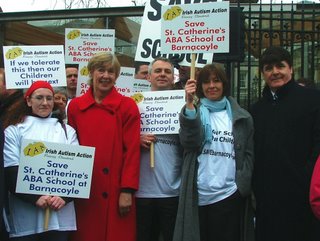As the State commemorations of 1916 approaches, some may have heard my comments on the need to commemorate all sides - and so I've attached a piece I wrote for the papers...so that the full argument can be read. I hope it's of interest, and I would welcome comments. I would like to mention also that 5 000 people took part in a march in January of this year in Derry at the annual Bloody Sunday commemoration march. Almost 4000 candles were lit in memory of ALL those who were killed in acts of violence linked to the Troubles in the North. It struck me that if this can be done 34 years after Bloody Sunday, then surely we are mature enough to do the same?
1916 Commemoration Should Honour all Combatants – no Matter what Uniform they Wore
By
Liz McManus TD
Deputy Leader of the Labour Party
Member of the Government All-Party Commemoration Committee
The interpretation of history can be simply politics conducted by other means. What we commemorate, whom we commemorate and how we commemorate are essentially political decisions made to promote contemporary results and resonance.
All mere ‘commemorators’ of the 1916 Rising, such as the President in her keynote speech at a recent seminar in UCC, face the challenge of how to reconcile the gap between a small uprising without a democratic mandate and a modern inclusive democracy. For the President to dispose of a charge of ‘sectarianism’ against the Rising is just too simplistic. The charge of religious sectarianism is not one that has been seriously levelled at the Rising – even by unionists – and could hardly be sustained against any enterprise that included James Connolly among its leadership.
The more serious and consistent charge made against the Rising is that it had no democratic mandate and gave renewed (and unneeded) vigour to the physical force tradition over the constitutional tradition in Irish nationalism. The issue of the absence of a democratic mandate is not so easily dismissed, since it was often invoked as the main philosophical basis for the Provisional terror campaign in the North.
The Rising, of course, reflected the attitudes of its time. It was a significant event in which Labour played a proud part but it was followed by a rapid evolution to democratic politics through the 1918 General Election, followed by the first Dáil Éireann early in 1919 and on to the establishment and consolidation of a parliamentary democracy in the Irish Free State.
A somewhat similar evolution may be traced in the events of the past thirty-five or so years in the North – the lesson being that, eventually, constitutional politics prevails and is the people’s preferred option over physical force. This is a lesson that Sinn Féin, above all the parties seeking to commemorate 1916, must take on board. Many of us remain to be convinced that their commitment to constitutional politics is not just a thin veneer overlaid on a grim reality of continuing criminality and gangsterism – north and south.
For democrats, the challenge is not just to commemorate 1916 but to apply some of its ideals in a way that is relevant in contemporary politics. Under this approach, the key phrase is ‘cherishing all the children of the nation equally’ - in the proper sense of its use in the Proclamation. In modern politics that equates with ‘parity of esteem’ for all the traditions or identities on this island.
The commemoration has already stimulated earnest debate around questions of Irish identity. Endlessly rehashed discussions about who died on the Somme or in Kilmainham in the summer of 1916 – and whether they should have or not – may be of interest to a small number of committed people or academics. Such discussions are of no relevance to a new generation of post-Celtic Tiger ‘thirty-somethings’.
In recent years, in pursuit of encouraging respect for the different identities on this island, official Ireland has shown a greater willingness to honour the men who fought and died in British uniform in the Great War. There is to be an official government commemoration this year of the 90th anniversary of the Battle of the Somme, in which the Ulster Division played such a prominent part. Some years ago, the President, together with Queen Elizabeth of Britain, participated in the official opening of an all Ireland Peace Park, at Messines, in Belgium.
These are important steps in the process of reconciliation. However, I believe the time is now right to take one further step to make our reconciliation fully genuine and inclusive. This year’s official commemorative ceremonies – and all future ceremonies - should honour all combatants involved in the Rising no matter what uniform they wore. Not just the Volunteers or the Citizen Army, but those who fought in British uniform, as well as the socialist, feminist and pacifist Francis Sheehy Skeffington murdered in Richmond Barracks by the deranged Captain Bowen-Colthurst, the civilians murdered in North Richmond Street by the same officer and the many other civilians – thirty five of them never identified – killed by both sides in the Rising.
Clarke, Pearse, MacDermott, MacDonagh, Colbert, Connolly – these are all names familiar to us from 1916. However, these same surnames occur in the lists of men decorated, wounded or killed in British uniform during Easter Week 1916 in Dublin. The Royal Dublin Fusiliers were among the regiments called upon to put down the Rising and Irishmen served in many of the other units involved. It is, I suggest, relatively easy for the Irish state to honour those who died far away in Flanders or Gallipoli. Are we tolerant enough now, ninety years on, to officially respect those troops of the same army who fell on the then Sackville Street or at Mount Street Bridge?
Eamonn Ceannt was a signatory of the Proclamation and was executed in Kilmainham on the 8th of May 1916. Yet his older brother, William, was a Company Sergeant Major in the Royal Dublin Fusiliers. Exactly a year after the Rising, on the 24th of April 1917, he lost his life during the offensive at Arras, in France, at the age of forty-six. The night before Eamonn Ceannt’s execution the 1916 leader wrote: ‘I bear no ill-will towards those against whom I have fought. I have found the common soldiers and the higher officers human and companionable, even the English who were actually in the fight against us.’
Asked if he had any message for the members of his firing squad, James Connolly replied: ‘I respect any man who does his duty according to his lights’. Connolly’s response should not surprise us unduly, for although he ended his honourable life in the uniform of a Commandant-General of the Citizen Army, as a young man he wore the uniform of a Scottish regiment while stationed in Ireland. Surely, if these signatories of the Proclamation could extend the hand of reconciliation even to the British soldiers who executed them, it seems churlish that we today could not do the same?
A separate, if equal, official commemoration of those who died on the Somme is no longer enough. That simply perpetuates a form of commemorative apartheid. What we need now is that the language of our official commemoration on Easter Sunday, of our speeches and our publications, should be truly inclusive and reconciliatory and thus extend to all the combatants of 1916, as well as to the innocent civilians.


